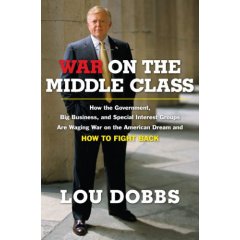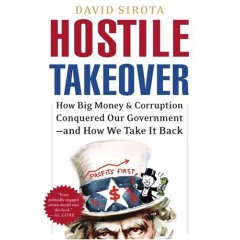DAVID SIROTA TAKES A LOOK AT DOBBS' BOOK, WAR ON THE MIDDLE CLASS
WAR ON THE MIDDLE CLASS'>WAR ON THE MIDDLE CLASS'>WAR ON THE MIDDLE CLASS'>WAR ON THE MIDDLE CLASS'>>WAR ON THE MIDDLE CLASS'>

A few weeks ago I compared Lou Dobbs' populism with David Sirota's. Today's New York Times has a great review by Sirota of Dobbs' book, War on the Middle Class. Sirota's review is called Pinstriped Populist and Sirota's review of his review is at the SirotaBlog. You ought to read them both (not to mention Sirota's brilliant Hostile Takeover, one of the two or three crucial political books of 2006).
Sirota generously glosses over Dobb's inability to focus on why the Democratic Party is fundamentally the better vehicle for his brand of economic populism than the party of institutionalized corporatism-- the party explicitly of Big Business, Greed, and Selfishness. He acknowledges that "Dobbs also peddles a few hackneyed right-wing talking points. For instance, he excoriates the news media as 'liberal.'" But overall, Sirota's enthusiasm for Dobb's overarching themes is... well, almost overwhelming.
Sirota sums up the Dobb's phenomena at the very end of his Times piece, effectively and succinctly: "cultural liberalism focusing on social issues that have only varying degrees of support among the general population is far different from full-throated Dobbs-style economic populism. It is undeniable that aside from Dobbs and a few politicians, America’s political debate is almost entirely devoid of economic populists. War on the Middle Class confronts this problem head-on-- and thanks to Dobbs’s passion and charisma, it succeeds in sounding an alarm that cannot be ignored."
To Sirota, Dobbs, his book and, more important, his TV show, are essential because they drag "a vicious economic battle being waged against the vast majority of Americans" into the light. Like Sirota himself-- albeit from another path-- Dobbs has looked at the irrefutable evidence and come to the conclusion that "'Our political, business and academic elites are waging an outright war on Americans.' He examines this economic war in chapters on wages, corruption, trade, outsourcing, immigration and health care, showing how moneyed interests devise policies that harm the public, and offering up his own set of solutions."

Unlike Sirota, Dobbs bends over backwards-- very awkwardly at times-- to push forward his "both sides" are equally corrupt theme. If you read Hostile Takeover you know Sirota never spares corrupt Democrats and that he skewers them with the facts of their perfidy as exquisitley as he chops up Republicans. If he makes examples of crooked Republican hacks like John Boehner, Newt Gingrich, Jim Nussle, Arnold Scwarzenegger, Grover Norquist, Tom DeLay, and Matt Blunt, he does the same for Democratic crooked corporate kiss-asses like Evan Bayh, Jim Moran, Joe Biden, Mary Landrieu, Ben Nelson and Joe Lieberman. Sirota also makes it perfectly clear that the rogue DLC Democrats have counterpoints inside the Democratic party, men and women who do stand up for the party's basic principles and values and for All-American fairness, such as Montana Governor Brian Schweitzer, Ohio's new Senator-elect Sherrod Brown, Vermont's new Senator-elect Bernie Sanders (sort of a Democrat), and Michigan Congressman John Conyers.
Dobbs, unfortunately-- perhaps a throwback to his partisan Republican/Wall Street past-- is as likely to attack "religious organizations that favor amnesty for illegal immigrants with the same fire he unleashes on corporate front groups that support illegal immigration because it provides cheap labor." Sirota assures us that Dobbs gets it right far more often than not (other than on the immigration debate) "as when he expertly skewers a health care system riddled by profiteering."
On his own blog, Sirota can stretch out more and he explains the inherent fallacies being force-fed to the mainstream media by reactionaries on both sides of the aisle, whether Rahm Emanuel and the DLC or Karl Rove, Joe Lieberman and Tom DeLay. "Dobbs-style populism, along with opposition to the Iraq War, was the overwhelming theme of the 2006 elections. There is no denying it. In the last few days, there has been a barrage of right-wingers and DLCers trying to hide this very simple fact. They have said the election was about Democrats pretending to be Republicans, citing people like Virginia Senator-elect Jim Webb-- even as Webb himself recently appeared on Dobbs’ show to give voice to the very kind of economic populism many of us have been pushing for years. And, of course, even in the face of the New York Times' own news page admitting the rise of populism this week, we are asked by the Establishment revisionists to simply forget about the election of red-region economic populists like Sherrod Brown, Jon Tester, Heath Shuler, Nancy Boyda and others."
I'll have to wait and see if Heath Shuler turns out to be an economic populist or the proponent of full-blown DLC hackery I fully expect his mentor Rahm to lead him blithely into. Still Sirota is right on the mark in pointing out that "polls show populism (aka. challenging economic power) is the 'center' position in the public, even though it may not be the 'center' position in a K-Street-owned Washington, D.C. On Tuesday, the true 'center' won out over Washington's faux 'center'-- whether our status quo opponents in Washington's think tanks, cocktail parties, congressional cloakrooms and lobbying firms like it or not."



0 Comments:
Post a Comment
<< Home